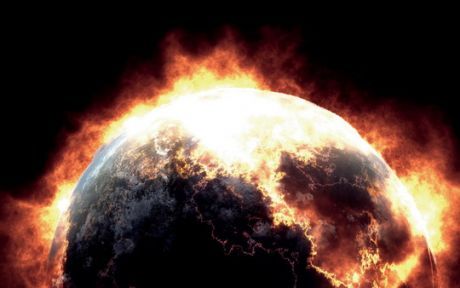Features
You are here
A world of oil and fire

July 22, 2015
While the west coast burns and oil spills across indigenous territories, Canada is sending fighter jets to set Iraq and Syria ablaze.
“It was a towering inferno. I thought the whole mountain, all the way down to the water, was going to be on fire,” said a resident on the west coast. According to recent reports there are 115 active fires across BC, 88 across Alberta and 95 across Saskatchewan. At their peak the fires block out the sun with smoke, rain down ash and cause evacuations. The fires torch the traditional territories of Indigenous communities and threaten the habitat of all living beings in the area, while destroying natural carbon sinks and increasing carbon emissions.
Fires and spills
Corporate media reports have claimed the fires are just “natural phenomena,” caused by lightning strikes, El Nino or unusually hot and dry weather. But the context is clearly global warming, as even the BC government admits in its Climate Change Adaptation Action Plan for Wildfire Management, 2014-2024: “Based upon an increase of 4 degrees by 2080, severe future wildfire conditions as a result of climate change are predicted for the southern interior of British Columbia including: increased fire size, increased fire severity, increased fire season length and fire frequency and a decrease in extent of fire free areas. Along with increasing wildfire potential, the costs of suppression response and the economic losses will also increase exponentially.”
But according to such assessments there’s nothing we can do to stop catastrophic climate change and the resulting fires. Instead it calls on us to create “fire resilient landscapes, fire adapted communities,” to live amongst the flames. This is because the same government is fast-tracking tar sands pipelines, while promoting fracking and coal, contributing to global warming that is driving the forest fires.
There are a series of oily myths: that the choice is between method of transportation (rail vs pipeline), or between location of refining (domestic or export), and that there are regulatory or technological solutions to concerns. But regardless of whether oil is exported or refined, or how it is transported, the oil economy destroys the climate and disproportionately impacts Indigenous communities--like Aamjiwnaang First Nation, surrounded by Chemical Valley.
As well as driving forest fires through carbon emissions, the oil economy produces inevitable spills regardless of the mode of transportation. Last week 160,000 liters of oil spilled from a derailed train in Montana while 5 million liters of tar sands oil burst from the brand new and supposedly “failsafe” Nexen pipeline in northern Alberta. This, the largest spill in Canadian history, is not only an environmental crime but also part of the slow industrial genocide against Indigenous peoples, as Eriel Deranger from the Athabasca Chipewyan First Nation explained: “There is no way to clean or reclaim the muskeg. Destruction and contamination like this directly affects a key component of our ecosystems is affecting First Nations’ ability to access lands and territories for hunting, fishing, gathering and trapping rights, rights protected by both the Constitution and our treaties. Yet, incidents like this continue to occur with little regard to the long term implication it has on our communities and our rights. This shouldn’t just be a concern for First Nations, muskeg is not just important to the eco-system and First Nations but it’s also one of the planet’s richest carbon sinks, something the government should be very concerned about.”
War on the climate
But while the BC government has already burned through its $63 million forest fire budget, the federal government is spending half a billion dollars on bombing Iraq and Syria. The gas-guzzling fighter jets are part of the largest oil consumer in the world, the military, whose endless wars increase carbon emissions. Ironically, some evacuees had to seek refuge at a military base in Cold Lake, Alberta, while troops were deployed in Saskatchewan to help put out the flames. Next month is the 10th anniversary of Hurricane Katrina, which exposed capitalism’s devastation of the planet through war and climate change. One of the slogans on the protests that followed was that “President Bush has troops in the wrong Gulf,” sending the national guard to the Persian Gulf to illegally occupy Iraq while ignoring inadequate levees in New Orleans, on the Gulf of Mexico.
To avoid the dystopian future of “adapting” to exponential forest fires and carbon emissions, while “managing” ecocidal and genocidal tar sands, we need to stop the endless oil wars, divert resources from tar sands into climate jobs, and support Indigenous communities. As Indigenous activist Melina Laboucan Massimo said in the lead up to the March for Jobs, Justice and the Climate, “For many of us from impacted communities the choices are literally life and death. It's time Canada stopped burying its head in the tar sands and bring about the just transition. Workers deserve to be with their families instead of flying across the country to work in the tar sands only to leave their families for 3 weeks out of every month...Everyone and every roof can be a part of the solar solution. Solar energy production is spill proof and emission free. Canada should aim higher and set a goal and commit to 100% of its power coming from renewable energy. We’ve been looking down far too long and digging the bottom of the barrel in dirty fossil fuels. We must now turn our gaze towards the sun and realize the true energy potential that is available to us here and now. We must choose to build healthy and vibrant communities before it is too late.”
Section:









